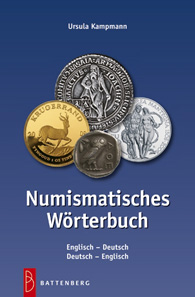by Björn Schöpe
November 1, 2012 – English is certainly the most important language in the numismatic world as well as in general. However, during business, coin shows or conventions or maybe studying certain catalogues or online auctions you may find it necessary to cope with German too.
As numismatics is a very specialised field it is not an easy task to find out for example what German ‘Rondenverwechslung’ means (actually it is off-metal error) or how do you want to understand what a ‘Münzregal’ is? ‘Münz-’ is coin, obviously. Checking in a common dictionary, though, you will learn that the meaning of ‘Regal’ is shelf or rack. You will probably not learn that in this case Regal is linked to Latin regalis, royal, and Münzregal is, hence, the coinage or minting right. You could find out this meaning very easily, though, by consulting Ursula Kampmann’s brand new Numismatic Dictionary.
Ursula Kampmann, Numismatisches Wörterbuch. Englisch-Deutsch, Deutsch-Englisch, Battenberg Verlag, Regenstauf 2012. 112 p., 12.5 x 19 cm, Paperback. ISBN 978-3-86646-085-0. 9,90 Euro.
In fact, the editor of CoinsWeekly, has drawn from her long and extensive working experience and gathered thousands of words which have a particular numismatic meaning or may be helpful to all those who are interested in numismatics and must read or write sometimes in both languages.
In the two sections, English-German and German-English, you will find many technical words like ‘Beischlag’ (imitative coin) or how to say ‘jugate bust’ in a description (Büsten nebeneinander), geographical and ethnical terms (actually the dictionary starts off with Aargau, a Swiss canton, and finishes with Zypern, Cyprus) like the Visigoths (Westgoten), and, of course, a lot of historical persons. Many words you could find in Wikipedia or the Encyclopaedia Britannica – but you cannot easily take other printed books to a coin show or on travel (and to the smarts: keep in mind that wireless LAN is not always at hand!). This one you can!
As the author herself states, it is ‘work in progress.’ Every selection is debatable and everyone will miss some term. That’s perfect: Let her know! At the end of the book you will find two pages with blank fields waiting to be filled out. Write all those words you would like to see included in a second edition and send it to the publisher. They certainly will appear the next time.
But also now this dictionary will be of great help to everybody who has to speak, write or simply understand something in the numismatic field in English and German.
You can find the book on the publisher’s website.
But certainly you may order this book directly through us. Send us an email.
Please do not forget that postage might be more expensive than the book; so perhaps we will find some coin dealers in the States, who will agree to sell this book.




